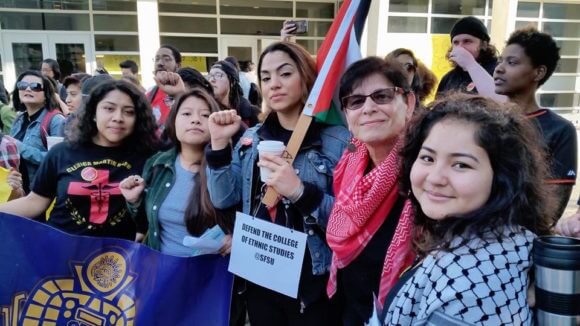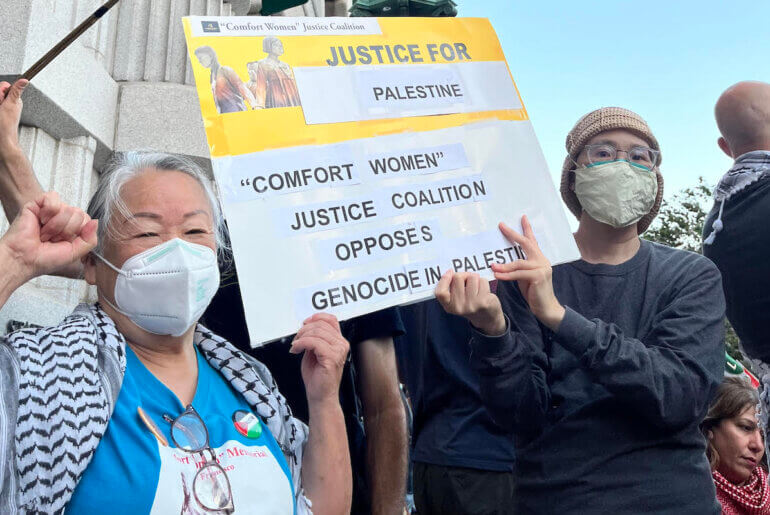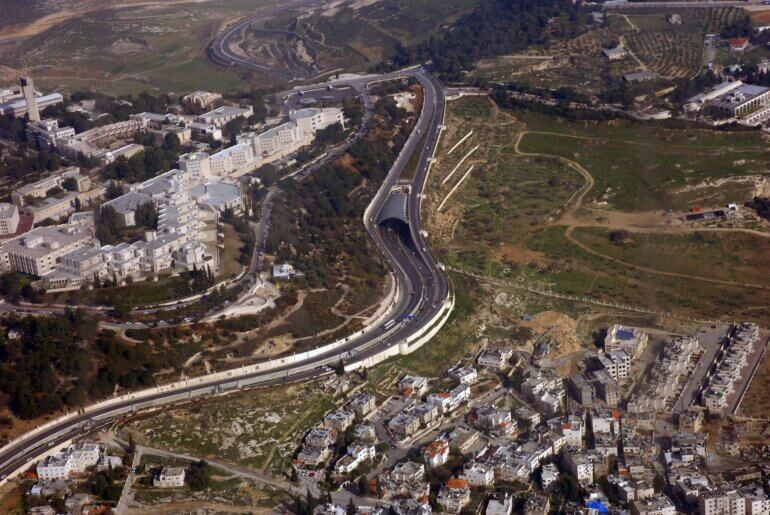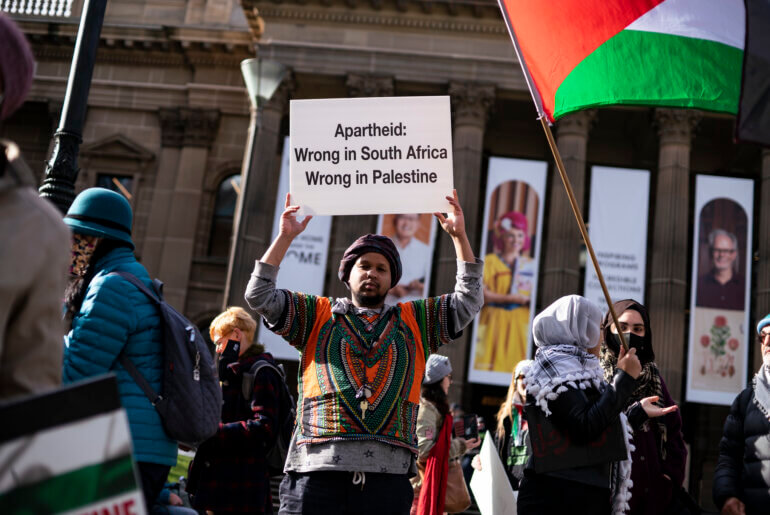This year marks several watershed historical moments that shape and influence the Palestinian struggle for justice, freedom, and return. These include the 40th anniversary of Israel’s 1982 invasion of Lebanon, the siege of Beirut, and the Sabra and Shatila massacre (Sept. 16-18, 1982) and link it to other watershed moments and anniversaries, such as the 50th anniversary of the assassination of Ghassan Kanafani in 1972; the 20th anniversary of Israel’s reinvasion of Palestinian Authority areas (Mar. 29, 2002 – May 10, 2002) and the Jenin massacre (April 3-11, 2002); the 20th anniversary of the beginning of Israel’s Apartheid Wall; and the 15th anniversary of the siege on Gaza (Summer 2007).
Teaching Palestine marks these important anniversaries critically and thoughtfully with two major international gatherings.
The first gathering is an international conference in Beirut, Lebanon on September 10 -11, followed by an international delegation from September 12 -16, initiated by the Arab and Muslim Ethnicities and Diasporas (AMED) Studies, and co-hosted by Beit Atfal Assumoud, and other Palestinian and Lebanese academic, research, and community groups.
The second is an international symposium in Tunis, Tunisia on September 10, 2022. Initiated by AMED Studies, the Symposium in Tunisia is co-sponsored by the Insaniyyat International Forum for Humanities & Social Sciences; the International Association of Middle East Studies; and the Institut de recherche sur le Maghreb contemporain (IRMC), and will will be held on the eve of the Insaniyyat International Forum for Humanities & Social Sciences.
We welcome you to register for the Beirut international conference (September 10-11) and the Tunis international symposium (September 19). Contact us at teachingpalestine2020@gmail.com with questions and sponsorship requests.
The framework
Building upon the conceptual framework and dialectical logic of this oral history and archival research project, the 2022 edition of Teaching Palestine: Pedagogical Praxis and the Indivisibility of Justice follows our praxis of commemorating major anniversaries in Palestinian history, highlighting intensified Israeli campaigns against Palestine, the Palestinian resistance movement and its Arab, Third World, and internationalist allies. As such, Teaching Palestine 2022 focuses (though not exclusively) on several watershed historical moments that shape and influence the Palestinian struggle for justice, freedom and return.
Placing these anniversaries in the same intellectual imaginary, paying special attention to each in its particular focus, and bringing them into conversation with each other, and the present historico-political moment, demands the production of a critical contextualized and historicized analysis of the systemic Zionist settler-colonial project that aims at erasing Palestine, not only from the geographic map but to simultaneously eliminate all traces of Palestinian indigeneity, with the overarching goal of delegitimizing what Palestine came to symbolize – a signifier of resistance and the indivisibility of justice.
In so doing, different components of Teaching Palestine (conferences, symposia, delegations, Open Classrooms, and publications) raise central questions as to what the responses to Israeli attacks have meant in their various dialectical and contradictory manifestations. This has included questions such as: how do we carve out and hold spaces for the testimonials of survivors and witnesses of massacres, including their lived realities amidst their second, third, or fourth displacements — from Tel al-Zaatar in 1976, to Shatila in 1982? What were the implications of saying goodbye to fighters as they were evicted from Beirut and scattered across the Arab world and the relocation of the PLO headquarters from Beirut to Tunisia?
How does the recent refusal of Jews in different groups to allow Israel to speak in their name compare to earlier and later anti-Zionist organizing? How do we speak of movement leaders who shifted their position on Palestine after having refused to allow Palestinians and Lebanese to speak years before, in the days of the U.S. peace movement? Many more questions abounded, but their overarching theme has been consistent — namely, what lessons can we draw from history, and what can we say about the present in order to craft a just future for all?

Teaching Palestine’s trajectory
The two international conferences and delegations are part of the Arab and Muslim Ethnicities and Diasporas (AMED) Studies’ multisite and multi-year project on Pedagogical Praxis and the Indivisibility of Justice, taking place in Beirut and Tunisia.
AMED Studies formally started Teaching Palestine in the 2016-2017 academic year. Its inauguration introduced conversations on “Palestine: Colonialism, Racism & Justice,” held in collaboration with the Center for Place, Culture & Politics at the CUNY Graduate Center, in addition to a number of other teach-ins, international conferences, and several other symposia and seminars in the years that followed, from NYC’s Left Forum in 2017, to MESA in the same year, to Birzeit University, An-Najah National University, Abu Jihad’s Museum for Prisoners Affairs, and Adalah in March 2018, to Cuba in June 2018, to Johannesburg and Atlanta in November 2018.
It also engaged with intersectional struggles, holding its Open Classroom Series in collaboration with several community partners within and outside the US, attracting thousands of organic viewers and covering issues such as interfaith solidarity, black liberation and abolition, the intersections between police violence in the U.S. and the killing of Palestinian youth, commemorating the Sabra and Shatila massacre, gender justice and resistance, intergenerational conversations on black liberation and the Palestinian struggle, and many other important interventions coverings various facets of the Palestinian freedom struggle.
Our activities were not without a cost. AMED has and continues to be subjected to a concerted campaign of repression and censorship by Zionist lobbying groups. Facebook shut down AMED’s page in 2021 in response to Israel lobby pressures, during which time our colleagues at the People’s Forum offered us a temporary refuge, hosting several significant anniversaries in solidarity with Palestine.
Narratives of resistance
A key question that lies at the heart of social movement analysis and studies of anticolonial resistance movements revolves around the ways in which different forces come together, under what conditions, why and how. Of particular interest to indigenous archives and oral histories of colonized and marginalized communities is to critically frame the meaning of such anniversaries and historical events — like the invasion of Lebanon, the siege of Beirut, the expulsion of Palestinian fighters, and the subsequent Sabra and Shatila massacre.
How would the narration of these momentous events shift when we place (the) marginalized (Palestinian and Lebanese) people at the center of analysis and let their experiences of pain and agony, as well as resilience and steadfastness ,speak louder than any international relations experts or “neutral and detached” observers, challenging conventional dogmas in the production of knowledge in the Social Sciences and the Humanities.
Methodologically, the pedagogical praxis of Teaching Palestine offers a comparative examination of repression and resistance through the narration of memories that are supported by the critical analysis of commemorations that place the perspective of marginalized communities at the center of inquiry. The 2022 Edition of Teaching Palestine reiterates the intentionality of challenging colonial narratives of submission, subjugation and defeat.
Instead, Teaching Palestine privileges a counter-hegemonic narrative of resilience, resistance, and steadfastness, reflecting the relevance of historical legacies to today’s struggle for Palestinian freedom. Such a comparative approach necessarily demands an urgent assessment of the fabric of Palestinian resistance groups, most of whom made up the PLO in 1972, 1982, during the Aqsa Intifada, and the current moment, while highlighting the limitations of achieving a semblance of justice through political settlements within the structural context of a hostile climate.
This hostile climate is characterized by deepening poverty, civil wars, imperialist interventions, unrestrained neoliberal economic policies, racial violence and the recolonization of previously decolonized nations. Rooted in xenophobic, Orientalist, Zionist, and other supremacist Ideologies, the consolidation of global and regional alliances under the guise of the so-called “war on terror” fueled an alarming rise in Islamophobic and anti-Arab racism and violent escalations targeting marginalized communities. Indeed Palestine, as well as the Tunisian, North African, and Arab Maghreb (and Mashreq and their Diasporas) site of this symposium embody and reflect these political, social, economic and socio-cultural dynamics that shape the learning environment within and outside the classroom and extend beyond campus grounds.
Teaching Palestine in the panopticum of the corporate university
In this framework, the rise of the corporate university, which is directly relevant to Teaching Palestine‘s pedagogical praxis, has shrunk the emancipatory spaces expanded by the radical movements of the 1960s and 1970s. Epistemological and pedagogical transformations challenged Eurocentric colonial education in the U.S. and internationally: New York City’s Ocean Hill-Brownsville; Berkeley’s Free Speech movement; and the student strike at San Francisco State University, led by the Black Student Union and Third World Liberation Front in 1968-69, or what we refer to as The Spirit of Bandung or the The Spirit of ‘68.
The Spirit of ‘68 demanded a school for Third World Studies, the decolonization of the curriculum, and challenged the university’s rigid campus boundaries and gatekeeping of community activism. Not delinked from COINTELPRO, Pentagon Files, and the anti-(Vietnam) war movement, these U.S. developments resonated with other international insurrections in Paris, Mexico, Senegal and Tunisia; the 1976 South African uprising against Bantu Education; the American Indian Movement rejection of “Boarding” and “Residential” schools; the resistance to “English Only” instruction throughout Latin America and the Caribbean; and the emergence of Palestinian autonomous universities as sites of anti-colonial liberation that impacted Palestinian intellectual life under Israeli colonial rule in the ’48 and the ’67 areas, and throughout refugee camps and Palestinian exilic Diasporas.
Targeting Palestinian education has therefore been intimately and strategically linked to Israel and its research and academic state institutions. Teaching Palestine — its history, geography, colonization, generations, and resistance — as an emancipatory pedagogical and advocacy project outside of Palestine has also been targeted, at SFSU and elsewhere, in the US/North American/Western academy.
The ultimate goal [of the U.S. and international donors] is to reverse the anti-colonial grounding of Palestinian education that accompanied the rise of the Palestinian liberation movement.
Education about and advocacy for justice for Palestine have been subjected to relentless campaigns by well-funded and politically connected to Israel lobby industry network (including white supremacists and Christian Zionists) that seek to silence, intimidate, and bully educators and students who study, research and engage in the praxis of Palestine. Their objective is to create a chilling effect of New McCarthyism, to stem the expanding tide of support for justice in/for Palestine on U.S. college campuses. They target dissenting and critical voices of the corporate university and seek to legitimize the alt-right and white supremacy (Trumpism) that target the study of marginalized communities, voices, and movements.
Although Trump is out of office and a new Administration occupies the White House, the attacks against people’s movements within and outside the U.S. proceed in full steam, as has been evident in political developments such as the “Summit of the Americas” or in the assault on Critical Race Theory, Women & Gender Studies, Indigenous Studies, Black Studies and Palestine Studies.
Targeting Palestinian education has also been increasingly evident in pressures applied by U.S. and other international donor agencies, such as the World Bank, European Union, and other aid agencies to impose revisions in Palestinian curriculum in return for funding Palestinian Authority institutions. The ultimate goal is to reverse the anti-colonial grounding of Palestinian education that accompanied the rise of the Palestinian liberation movement, rewriting the history of repression and resistance, and erase Palestinian narratives.

Pedagogical praxis and decolonizing the curriculum
Whether at SFSU or around the world, decolonizing the curriculum fed social movements that were, in turn, harshly suppressed by the state apparatus, from Latin America to the Philippines, from Indonesia to Mexico, and from Central and Southwest Asia to North, East, Central, West, and Southern Africa.
Israel and other settler-colonial regimes has targeted and harshly suppressed campus activism, as well as the infrastructure of education.
Palestine was not an exception (and nor was it elsewhere in the Mashreq and in the Maghreb). Throughout Palestinian (and Arab and Third World) history, Israel and other settler colonial regimes has targeted and harshly suppressed campus activism, as well as the infrastructure of education. For example, the 2002 reinvasion did not only witness the brutal punishment of the Jenin refugee camp for its daring resistance to Israeli military might (recently repeated in the assassination of Aljazeera journalist Shireen Abu Akleh to prevent her from exposing Israeli violations of Palestinian rights); Israel destroyed schools and educational institutions, including Palestinian ministries of Education and Higher education.
Earlier, during the 1987 Intifada, Israel closed Palestinian universities and schools for several years, banning popular clandestine education, punishing educators and parents who dared violate the criminalization of Palestinian education. The gravity of Israel’s colonial rule and its assault on Palestinian education is evident in the fact that not a single commencement at any of the Palestinian universities has ever enjoyed a full graduating class.
The need to narrate people’s histories of resistance and insist on being a legitimized part of the curriculum has never been so urgent. The 50th anniversary of Kanafani’s assassination, the 40th anniversary of the 1982 Israeli invasion, the 20th anniversary of the 2002 reinvasion and the Israel Apartheid Wall, as well as the 15th anniversary of the blockade of Gaza/Palestine, offer such an opportunity to link what happens outside the classroom with the content of our curriculum and scholarship. Producing justice-centered knowledge must not be seen as a luxury but as a necessity to achieve another world.
Teaching Palestine in Beirut and Tunisia brings together scholars, public intellectuals, community activists and leaders and organic intellectuals to historicize and contextualize the praxis of Palestine in its multiple manifestations and nuanced dialectics, providing a much needed space to think through how to move between the inside of the classroom and the outside of campus, and above all hold ourselves accountable to a complex, nuanced and exciting intellectual line of inquiry. Building on multi-site conversations inside and outside the academy, scholars, advocates and activists from Africa, Asia, Latin America, the Caribbean, Europe, North America and other settler colonies such as Australia and New Zealand will weave theory and praxis in pedagogical, intellectual and community imaginaries.
Register for the Beirut Conference
Register for Tunisia Conference
Dr. Rabab Abdulhadi would like to acknowledge the valuable intellectual and organizational contributions of the Teaching Palestine 2022 Team Members, Dr. Jamila Ghaddar, Leith Ghuloum, Mariam Karim, and Saliem Shehadeh to this article.
Dr. Rabab Abdulhadi
Dr. Rabab Abdulhadi is the founding director and senior scholar of the Arab and Muslim Ethnicities and Diasporas (AMED) Studies at San Francisco State University, and Associate Professor of Ethnic Studies and affiliated faculty in Sexualities Studies.




On the topic of the Zionist conception of justice, I highly recommend Jewish Israeli scholar Israel Shahak’s knowledgeble and thoughtful book.
Jewish History, Jewish Religion: The Weight of Three Thousand Years
https://ifamericansknew.org/cur_sit/shahak.html
The recent book by Ahed Tamimi and Dena Takruri would make a good addition to any reading lists
https://www.amazon.co.uk/They-Called-Me-Lioness-Palestinian/dp/0593134583/ref=sr_1_1?crid=19SSW88TMKNKY&keywords=ahed+tamimi&qid=1662815138&s=books&sprefix=ahed+tamimi%2Cstripbooks%2C81&sr=1-1